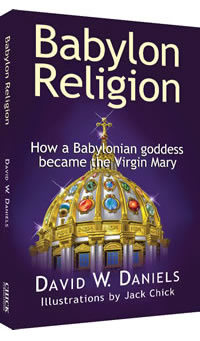Doubt! Satan's Sharpest Arrow
- Issue Date: January/February 2011
While chatting with a young student at a Bible college, he remarked that he was considering studying Greek in order to read the Bible in the original languages. I then asked him, "Which Greek text will you read?" His blank look of confusion was typical of most Bible students.
Few people today are aware of one of Satan's greatest victories that he pulled off over a century ago. Satan has always had a bull's eye on God's word, beginning with his sly question to Eve: "Yea, hath God said...?"
Over and over, Lucifer has drawn his bow and shot this arrow of doubt into the human heart. He succeeded in stirring up enough unbelief in the children of Israel that they had to mill around in the wilderness for 40 years within a short distance from the Promised Land.
The Old Testament stories are filled with doubters, including some of the most famous. Adam doubted that God meant what He said about the forbidden fruit. Sarah laughed at God's promise of a child in her old age. Patriarchs and prophets, alike, had their moments of doubt.
When Jesus spoke God's words, most who heard Him doubted them, even when they saw the miracles. Throughout the record of the Acts of the Apostles, some believed their preaching, others doubted and strove to silence the messengers. Paul was hounded from city to city by the doubters.
Finally, when the Bible was complete, Satan had a single target: DESTROY THAT BOOK! Believers spent months making hand copies, only to have them burned. But Jesus kept His promise that "heaven and earth shall pass away, but My words shall not pass away." (See Matt. 24:35.)
Faithful copies of the originals were preserved, sometimes by believers hiding in caves. When Gutenberg invented the moveable-type printing press, Satan lost that battle. Hundreds, eventually millions of Bibles flooded the world.
At that point, Satan had to fall back on his old strategy of creating doubt in God's words. Working through his ever-faithful prostitute church, headquartered in the Vatican, he set out to pollute the Bible. If people had to choose between different versions of the Bible, which had contradictory meanings, how could they trust that they had the true Words of God? (Oh! Oh! There's that "doubt" thing again.)
In spite of the fact that there were thousands of manuscripts supporting the existing Bible, two or three "new" discoveries of "older" manuscripts were arranged. One was conveniently "uncovered" in the vast Vatican archives. Another showed up in a wastebasket in a monastery near mount Sinai, "found" by German scholar Constantine von Tischendorf, after a lengthy audience with the Pope.
Word went out that, because these were "older" than all the existing manuscripts, they had to be more accurate to the lost originals. All who questioned this faulty logic were promptly shouted down.
The pope's henchmen were assembled to update the Bible using these "better" texts. Among the unbelievers chosen for this were two key players: Brooke Foss Westcott and Fenton John Anthony Hort. Their task was to come up with a new Greek text based on these "discoveries." This became the foundation document for all the "modern" Bibles. Word spread quickly that the Bible that most people had trusted for 300 years was "antiquated, hard to understand, had obsolete language, etc." Confusion reigned and doubt has swept the land. In my mind, that confusion is framed in the picture of my young friend's face when I asked which Greek text he planned to study.
Satan's strategy has worked, probably better than he had dared to hope.
Examine your own heart. Is there a "deep, settled peace" that the Bible you hold in your hand is, indeed, the words that Jesus promised would "not pass away?" For more details of this strategy of Satan, read Did the Catholic Church Give Us the Bible? and Look What's Missing, by David W. Daniels.
- See more articles on related topics:
- Bible Versions
- Bible Translation
- Counterfeit Bibles
Other Articles from January/February 2011:
- Confusion Growing over Tolerance of Homosexuals
- Like Eating an Elephant!
- Parents Fighting Back Against Government Schools
- Seed Planted in the Philippines Now Ready for Harvest
- Warning: Disney 'Magic' Toxic to Children
- Israel Wary of Vatican Synod
- Message From Jack Chick January/February 2011
- Chick Mail Bag January/February 2011
More on Bible Versions:
Products of Interest:
-

Babylon Religion
224 pages
Learn how a Babylonian goddess became the Virgin Mary. An easy-to-read history of Catholicism's Babylonian origin. -

Did the Catholic Church Give Us the Bible?
208 pages
The Bible has two histories. One is of God preserving His words through His people. The other is of the devil using Roman Catholic "scholars" to pervert God’s words and give us corrupt modern Bibles. -

Tares Among The Wheat
Rome & The History of Higher Criticism - Most of what today`s Bible scholars believe about manuscript evidence is based on a few events from the 19th century, and the footnotes in your Bible are the proof of it.



